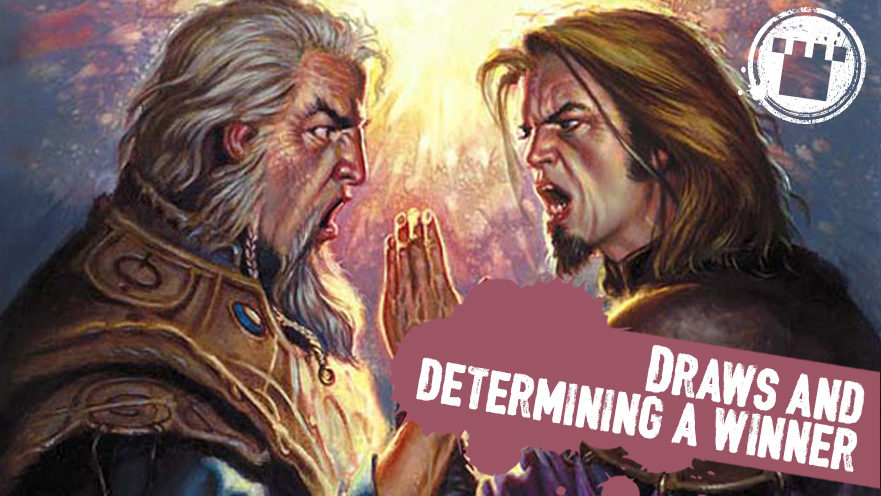You’re facing off against your opponent in an all too intense match of Magic: The Gathering, and time gets called signaling the end of the round. The match is tied one game apiece, and you hear the judge say, “Ladies and gentlemen, that is time in the round. You have five additional turns with which to resolve your match.”
Many of you have reached this point, as games sometimes get into complicated board states where one army is facing another and attacking would just be futile. Or maybe there’s nothing in play, and there are very few good plays you each can make as you top-deck your way to the finish. Regardless, you’ve reached the end of the round and would like to resolve the game fairly. What do you do?
Whether you are at a prerelease, an FNM, a PPTQ or a Grand Prix, the way to settle a game of Magic: The Gathering is by playing Magic: The Gathering. Play out the five turns allotted, and if neither player can win, then the match is a draw. Unlike most other sports where there is usually a clear winner, draws can and do happen in Magic.
Player: “Wait, there can be no winner?”
Judge: “Yep. You have reached a draw.”
Player: “So what happens now?”
Now you have three options:
- You can concede the match to your opponent.
- Your opponent can concede the match to you.
- You both take a draw.
In Magic tournament play, a match win gets you three points, a draw gets you one point, and a loss gets you zero. These are the three possible outcomes of a match.
At the start of your match, you and your opponent can also agree to an Intentional Draw (ID). This is where both players agree to take a draw (and earn one match point apiece) instead of playing out the match. In the later rounds of a Swiss-style event, it is sometimes beneficial to take a draw and guarantee both players make it into the Top 8.
Additionally, you should not offer your opponent anything in exchange for a match win, as bribery carries a penalty of disqualification from the tournament. This falls under the IPG Section 4.4: Bribery and Wagering:
“A player offers an incentive to entice an opponent into conceding, drawing, or changing the results of a match, or accepts such an offer.”
People often want to know what they can and can’t say when offering a concession or a draw. The clearest it can be put: You cannot agree on the results of the match and any prizes at the same time. Both decisions need to be made independently, so that neither decision is influenced by the other.
Here’s the easiest way to say it:
Player A: “Would you like to concede the match?”
Player B: “Okay.”
Player A: “Great. How about a split of the prizes?”
This is acceptable because the players agreed to the match result before they discussed prizes. However, imagine Player A had said this instead:
Player A: “If we agree to split the prizes, would you like to concede to me?”
This isn’t acceptable because the offer is contingent upon a prize split. This is bribery.
Here are some other examples of bribery from the IPG:
- A player in a Swiss round offers his opponent $100 to concede or draw the match.
- A player offers his opponent a card or cards in exchange for a draw or concession.
If you would like assistance to avoid incurring a penalty, please call a judge and step away from the table. We are always happy to help.
But what about a scenario like this?
Player: “We don’t want to draw the game – can’t we just roll some dice to break the tie and see who wins?”
No. Do nothing to determine the winner on your own.
There will be no dice rolling, coin flipping, rock-paper-scissors-ing, arm wrestling, subgames of Magic: The Gathering above or below the table. Even if your opponent is okay with it, any of these actions are considered gambling and will result in your disqualification from the tournament.
According to Infraction Procedure Guide (IPG), Section 4.3: Improperly Determining a Winner:
“A player uses or offers to use a method that is not part of the current game (including actions not legal in the current game) to determine the outcome of a game or match. A player who receives an offer and does not immediately contact a tournament official is considered complicit in the offer and will receive the same penalty.”
Judges typically see these things happen at prereleases and FNMs. Younger players and casual players playing in their first tournament don’t know that what they’re doing is wrong, and that it carries such a severe penalty. Disqualifications at Regular REL are always unfortunate, but these infractions affect the integrity of an event, and as judges, we must work to discourage gambling and collusion.
It also makes us judges sad to have to disqualify someone from an event. Please don’t make us sad.

